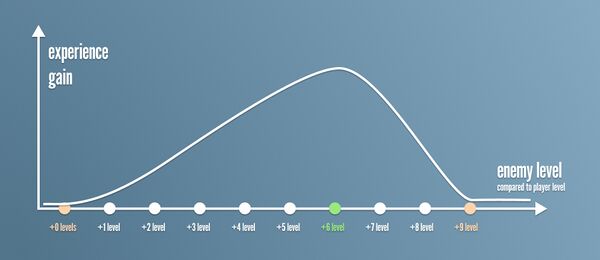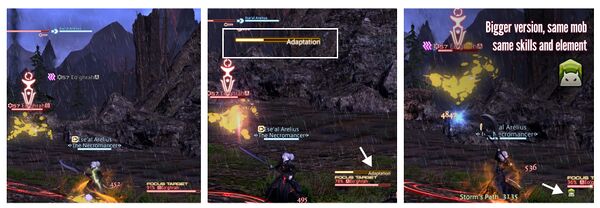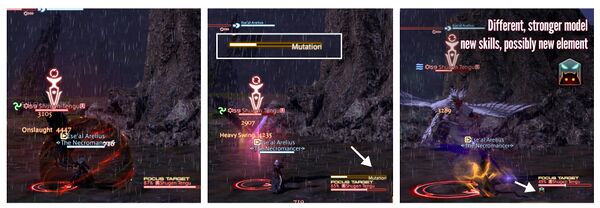LEVELING LOGIC IN EUREKA
Experience in Eureka scales according to several factors:
- the size of your group
- the level difference between you and party members
- the level difference between you and the enemies
- how high the chain is
- If enemy is mutated/adapted* (Pagos, Pyros, Hydatos)
HOW TO UTILISE THIS LOGIC
1) The bigger your party is, the higher enemy level you should pick as you can keep the chain more easily.
2) Max difference between lowest and highest level player in a party must not be more than 8 levels! So if you want to pair with a level 20, you must be at least level 12.
3) The experience scales as follows:
- enemy under your level: useless
- enemy of your own level: very very bad exp
- enemy 1 level higher: okay exp
- 2 levels higher: better exp
- 3 levels higher: better exp
- 4 levels higher: better exp
- 5 levels higher: quite good exp
- 6 levels higher: best exp you can possibly get, the sweet spot
- 7 levels higher: same as 5 levels higher
- 8 levels higher: same as 4 levels higher
- 9 levels higher: no more experience gain
4) The chain caps at 30, experience is a little bit higher the higher the chain is, and it gives bonuses every 5 levels. Your magia wheel is showing the chain. If you're not chaining, it means you're either too slow or not getting experience.
The chaining logic becomes especially important in Pagos and Pyros where enemies have a chance to adapt/mutate, which on itself gives an experience bonus. Try to aim to kill mutations/adaptations at chain 5, 10, 15, 20, 25 or 30 for extra bonuses. In Hydatos, mutation/adaptation rate is 100% so you don't have to pay extra attention to that.
5) Under certain conditions, enemies in Pagos, Pyros and Hydatos can mutate or adapt.
- Mutation: enemy changes its model, often changes elements and all of its skills. It gives very high experience compared to non-mutated enemies.
- Adaptation: enemy retains its model, skills and element, but changes its size and starts hitting harder. Gives high experience compared to non-adapted enemies.
In Pagos the A/M rate is pretty low, in Pyros is about 70% and in Hydatos is 100% - as long as you know weather/time of day conditions. In Pyros and Pagos the rate also seems to be connected with how rare the enemy is, or how strict the weather is. (For example, Anubyses in Pagos can mutate under ALL conditions so their mutation rate is low, but Griffins only mutate during one weather condition so during that weather their mutation rate is relatively higher).
For information about what mutates under what weather conditions, check the bestiary.
General Guidelines for Leveling in Eureka
- Always keep up your food buff, Potion of Harmony and Elemental buff. Use Eurekan Potions for sustained healing.
- Try to go for enemies higher than your level. If alone, focus enemies 1-2 levels higher. If in a group, try to go as high as you can, remembering that experience gain maximizes at +6 levels. Keep the kill chain up.
- Don't be partied up with friends who are too high of a level for you. Remember you should be in 8 level range of each other.
- If mutations/adaptations are available, always focus those enemies for higher experience gain (This applies in Pagos, Pyros and Hydatos).
Challenge Log
As you kill mobs of a certain type, you will be filling out your Challenge Log.
It is advisable to keep the log incomplete for as long as possible. The experience gained from completing each log will scale significantly the higher level you are, and so it is worth more at higher levels. However, if you start leveling on a Sunday or Monday, for example, it makes sense to do the log as soon as possible before the weekly reset on Tuesday so that the experience gain isn't lost.





